
My heart ached with wrenching concern while I sat in the hospital with someone whom I love immensely. I was fortunate to be present when a lovely soul entered the room. An elderly hospital volunteer had a gentle way about her. She held a long, thin piece of paper with a poem excerpt that she hoped would encourage patients. These printed words would change my perspective forever:
“Beyond a wholesome discipline, be gentle with yourself.
You are a child of the universe no less than the trees and the stars;
you have a right to be here.”
Inspiration for self-love
This was the very first time the concept of self-love and acceptance penetrated my understanding. You know that moment when something familiar clicks into place in a new or different way. It is likely the sorrow that I felt with my loved one in the dim hospital room created a crack for this to seep into. Up until then, I had a “persevere at all costs” approach to life. I thought this attitude was admirable, and in some ways, it had served me well, helping me reach my achievements. But, it came at a cost. To make light of my exhaustion, I would say quippy things like, “I’ll relax when I’m dead” and “Sleep is overrated.” I didn’t realize that the “pull-up-my-bootstraps” passion and lack of balance had a negative downside. Not realizing, I sacrificed aspects of everything that I said was most important to me: health, relationships, and spirituality.
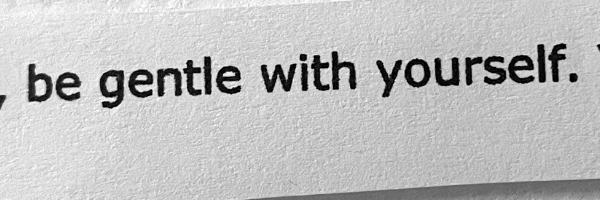
I didn’t even know where to begin to be gentle with myself. When I started to explore the idea, I had an instant sense of panic. My mind associated gentleness with the loss of focus and traction in the competitive marketing industry that I was in. I thought I had too much at stake to show myself Kindness. I had put myself on a never-ending hamster wheel of pressure by measuring my value based on professional achievements. This meant that I was only as good as my last client’s praise and the next signed contract. Thankfully, Max Ehrmann, the author of this timeless poem from 1927, was ahead of me. For guidance on how to apply gentleness to myself, all I had to do was keep reading.
You are perfectly made
First, the author reminded me whose I am. The next part read, “You are a child of the universe.” In everyday life, when I come to hear or read the word “universe” in the context of human creation, I exchange it for “God” to make it more relevant to my own Christian faith. Ehrmann was a progressive thinker, giving his readers permission to interpret “universe” in a way that is individually meaningful when he also writes, “…God, whatever you conceive Him to be.” So what this means to me, based on the Bible’s promise, is that both I am purposely and perfectly created by God and that I am His beloved child. Although I had heard this many times before, this context made it go deeper, to a place of true believing, not just logical understanding.
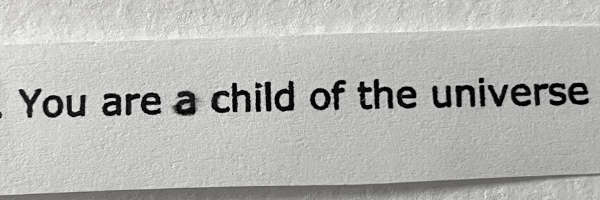
The need to be known and accepted unconditionally goes beyond our spiritual yearning to understand our purpose and creator. This acceptance is also our ingrained human need for Connection with each other. I explore that more deeply in another blog post.
So whether your god is Jesus, like mine, or Shiva, Buddha, Allah, Yahweh, someone different or maybe no one at all, you belong. I belong. We all belong, just as we are. We are all children of the universe.
You are as magnificent as the most wonderous creations
The next words, “no less than the trees,” were as if Ehrmann knew my adoration for the forest and specifically wrote this so that I could relate. In the darkness of the hospital room, I closed my eyes and was mentally transported to the quiet butterscotch-smelling, Ponderosa Pine expanse that has become my place of solace. I’m sure that others feel the same when they are struck by the awe of a star-spun sky that he mentions. Trees just happen to be my thing.
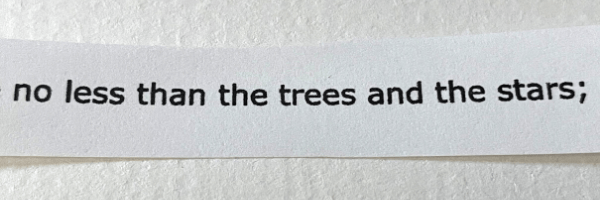
I pondered if my value could really be the same as my treasured trees. And this was when I first began to accept that unconditional belonging could pertain to me. I am wondrously created, despite all of the characteristics I am brainwashed to think of as flaws. And so are you.
You belong, just as you are
Then, he reminded me who I am, a beautifully created being, precisely as God made me. Ehrmann doesn’t write “you have earned your right to be here” or “you must prove that you are worthy of being here.” He also doesn’t say, “You have molded yourself to social expectation and now have the right to be here.” Instead, he writes the truth that the world makes us doubt, “you have the right to be here.” Right here, right now, just as I am. And, just as you are.
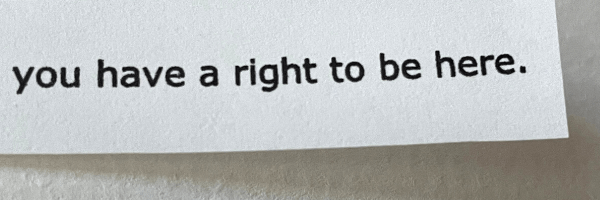
As each tree has its own unique bark pattern, broken limbs, and trunk shape and size, I have a right to be here, with all of my uniqueness. The aspects that make me different and often feel inferior make me a beautifully imperfect person. My lack of ability to do more than basic math nudges me to rely on others who excel in this area. My terrible memory for dates makes me appreciate when people remember my birthday. Recognizing my challenging time management skills makes me even more conscious of the need to be on time. Now, I try to think of these not as poor character traits but as weaknesses that help me be humble and appreciate others who bring these gifts.
This makes me wonder what our increasingly crazy world would be like if we could see each other’s differences as what makes us interconnected, reliant people. And those differences are lovely, to be explored and celebrated. This begins with me accepting who I am. It is only then that I can fully appreciate others’ differences as a beneficial contribution too.
Commit to being gentle with yourself
To put gentleness and absolute worthiness into practice, I went back to the beginning of the excerpt. “Beyond a wholesome disciple.” It’s easy to gloss over these words as merely an introduction to the plea to be gentle to yourself. But, I discovered this is where the concept gets infused into everyday life.
Later I would discover that the title of the poem, Desiderata, means “things desired,” or another definition is “things lacked and wanted.” This made me ask myself, “What do I truly desire?” and “How do I keep focused on those desires when outside influences to strive for worldly things are so strong?” It is indeed a discipline to have intentional and consistent awareness and action towards what is truly wanted. However, the first step is to seek the right things. This was a turning point for me. Instead of yearning for commercial-based success, I adjusted my aspirations to things with wholehearted benefits, including gentleness to myself.
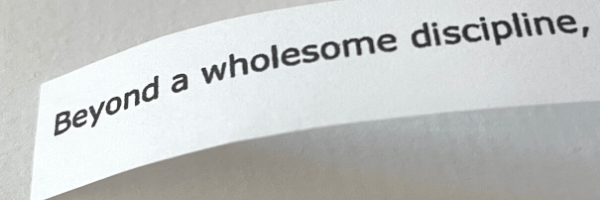
I began this journey by giving myself just ten minutes of peaceful time a day. It may sound simple, but even this short amount of time felt like it was too much to give myself, too “unproductive.” That tiny gift of time has now grown into daily “me time” routine that may include meditation, prayer, reading, breathing exercises, or yoga.
Although not easy, creating a habit to give myself what I need has made a tangible difference in my life. This daily discipline has quenched the senseless temptation to sacrifice myself and others for false achievements. I’ve gained more emotional and physical well-being, peace, and clarity that is beginning to heal decades of self-inflicted negligence.
R.O.C.K., my desiderata
After decades of striving to have it all, I did have it all, including an incurable autoimmune disease, a warped sense of purpose, and strained relationships. I put myself into a messed up cycle with no foreseeable exit. It wasn’t until I hit a low point in my life when I started to see the futility and harm of what I was chasing. This was when the four R.O.C.K. principles, Respect, Ownership, Connection, and Kindness, began to reveal themselves as what I desired, as my desiderata.
Today, I try to apply these principles to all aspects of my life. Here’s how I use R.O.C.K. in my self-gentleness journey:
I have a much deeper Respect for myself through unconditional acceptance.
I take Ownership by being aware and taking action accordingly, not ignoring my physician, emotional and spiritual needs.
I prioritize time to make Connections within myself, quietly listening to what I am feeling in my body and heart.
Lastly, as Ehrmann urges, I show myself Kindness through gentle thoughts and nurturing actions.
Initially, I was inspired by just a small excerpt of the poem. Not surprisingly, the entire poem oozes with wisdom. Sometimes when I need a quick two-minute boost of inspiration and renewed faith in humankind, I play my favorite narrated version of Desiderata at this link. Or I read the framed copy that hangs eye-level next to my desk. Other excerpts provide thoughtful encouragement for each of the R.O.C.K. pillars. Here are my favorites:
Respect
“Speak your truth quietly and clearly; and listen to others, even to the dull and the ignorant; they too have their story. Avoid loud and aggressive persons; they are vexatious to the spirit.”
Ownership
“Be yourself. Especially do not feign affection. Neither be cynical about love; for in the face of all aridity and disenchantment, it is as perennial as the grass. Take kindly the counsel of the years, gracefully surrendering the things of youth. Nurture strength of spirit to shield you in sudden misfortune.”
Connection
“As far as possible, without surrender, be on good terms with all persons. Therefore be at peace with God, whatever you conceive Him to be. And whatever your labors and aspirations, in the noisy confusion of life, keep peace in your soul.”
Kindness
And of course… “Beyond a wholesome discipline, be gentle with yourself. You are a child of the universe no less than the trees and the stars; you have a right to be here.”
And as you explore your own self-love, I welcome you to share your experiences in the comments.
ROCK thru to your own desiderata! XO ~Lee
Want more Inspiration to ROCK thru life?
Follow on Social Media for Weekly Updates:
Go Deeper into Each Principle:
Respect
Ownership
Connection
Kindness
Let’s Discuss
When we share with each other, we all learn and grow. Use the area below as a forum to go deeper. Provide your input. Start a conversation. Share your experience or perspective.
Please comment with Respect and Kindness. For more information, review the Guidelines for Discussion.
